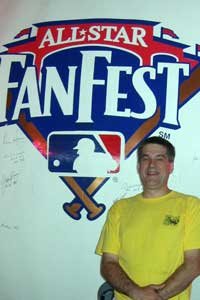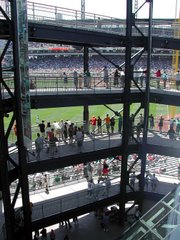Congratulations to Mark Buehrle (try that one in a spelling bee) on his no-hitter last night. And congratulations to White Sox manager Ozzie Guillen for actually leaving Buehrle in the game for all nine innings. These days, you'd expect a middle reliever to enter the game in the seventh, even if the starter hasn't given up a hit.
I remember a game back in 1990 in which California lefty Mark Langston, who'd signed a contract in the off-season making him the highest-paid player in baseball at the time, pitched seven innings of no-hit ball. Then he watched the last two innings. I guess the Angels were protecting their investment.
No-hitters have always made for interesting commentary by baseball historians, because each has a story. Some of my favorites:
John Montgomery Ward, 1880. The future Hall of Famer (not the guy who opened the department store, though) pitched a perfect game: 27 men up, 27 down. A guy named Lee Richmond had accomplished the same feat just five days before, pitching for Worcester, Mass., which at the time was in the National League. Because the perfect games occurred so close together, fans apparently figured that was something they'd see fairly regularly. But ...
Jim Bunning, 1964. The next perfect game in the National League occurred 84 years after those of Richmond and Ward. Bunning, a Hall of Famer and U.S. Senator, mowed down the Mets on Father's Day. My own father happened to be visiting New York at the time for the World's Fair, but says he was talked out of attending the game at Shea Stadium that day. Live and learn.
Bumpus Jones, 1892. At the tail end of the season, Cincinnati gave a 22-year-old kid named Charles Leander Jones a chance to pitch. He made the most of it, shutting down Pittsburgh without a hit in his major-league debut. Before the 1893 season, they moved the pitching mound 10 1/2 feet farther away from home plate. Jones didn't adapt too well. In seven games, he racked up a 10.19 earned-run average and exited the big leagues with just two wins to his credit, including the no-hitter.
Bobo Holloman, 1953. Alva Lee Holloman did Charles Leander Jones one better. That is, he had three major-league victories, including the no-hitter he threw in his first start, for the St. Louis Browns.
Andy Hawkins, 1990. Younger fans who see the Yankees in the playoffs each and every year might not remember that they stunk for quite a while in the late '80s and early '90s. Hawkins didn't help the cause with his 5-12 record in 1990. Among the losses was a game he managed to lose 4-0 to the White Sox without surrendering a hit. To his credit, none of the runs were earned. But speaking of credit, Hawkins doesn't officially receive it for his no-hitter. The game was in Chicago, which didn't have to bat in the ninth, so he pitched only eight innings.
Matt Young, 1992. In his first start of the season for the Red Sox, Young held Cleveland hitless through eight innings but lost, 2-1. He hardly helped his cause by walking seven Indians. And as was the case in Hawkins' no-hitter, Cleveland didn't have to bat in the ninth, so Young didn't receive official credit for his "gem." It gets worse, though. Young was dropped from the rotation after four ineffective starts, and he managed to finish the season with an 0-4 record despite his "no-hitter."
Dick Fowler, 1945. Fowler was a member of the Canadian Army who was released from the service in time to pitch in a handful of games for the last-place Philadelphia Athletics before the season ended. In one start, he no-hit the almost-as-bad St. Louis Browns. That marked his only victory of the season.
Sandy Koufax, 1965. No-hitters were an annual occurrence for Koufax between 1962 and '65, and his most impressive was the final one, a perfect game against the Cubs in which he struck out 14. His mound opponent, Bob Hendley, did almost as well, giving up just one hit. Dodger Stadium just wasn't a hitter's park in the '60s.
Bob Forsch, 1978. In the only no-hitter I ever saw in its entirety (on television, of course), Forsch beat the Phillies, 5-0. At least, it's in the books as a no-hitter. In the top of the eighth, Philadelphia's Garry Maddox hit a rocket somewhere in the neighborhood of St. Louis third baseman Ken Reitz, who made a valiant stab at the ball. Even though Brooks Robinson in his prime wouldn't have gotten the speedy Maddox out, the hometown official scorer gave Reitz an error. Maddox promptly was erased on a double play grounder, and one inning later, Forsch had his "gem."
Trivia question 22: Who are the only brothers to pitch no-hitters in the majors?
Thursday, April 19, 2007
Subscribe to:
Post Comments (Atom)









No comments:
Post a Comment